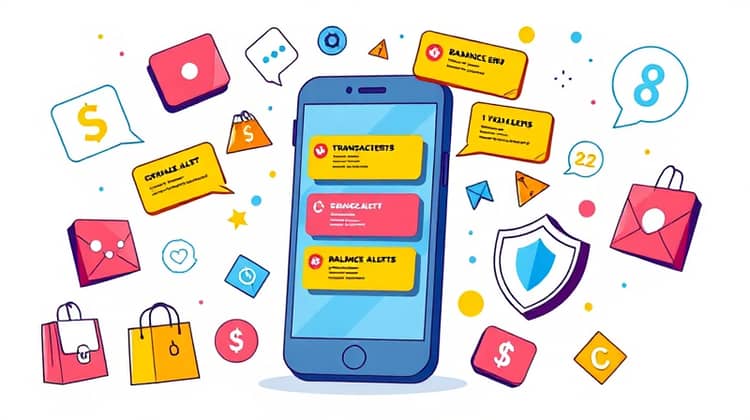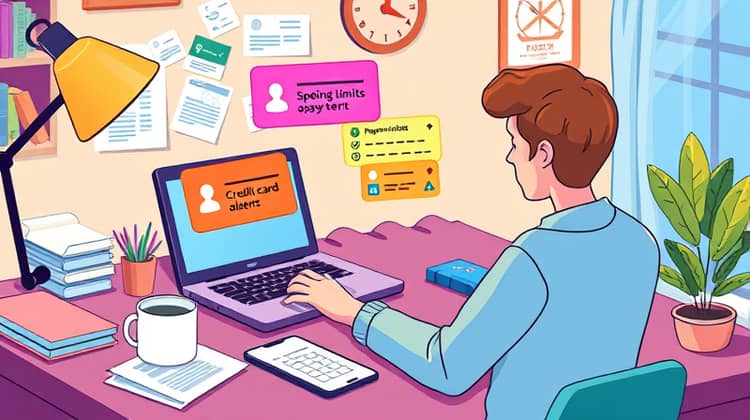Credit Card Alerts: 5 Simple Steps to Set Up and Stay Informed

In today's fast-paced world, managing your finances effectively is more critical than ever. Credit card alerts have emerged as a vital tool for consumers, empowering them to monitor their spending, payments, and overall financial health in real-time. This guide will explore the various aspects of credit card alerts, focusing on why they are essential and how to set them up efficiently.
With just a few simple steps, you can ensure you never miss a crucial update regarding your credit card. These alerts are not only beneficial for tracking your transactions but can also serve as a safeguard against fraud and unexpected fees. Understanding how to manage them effectively can lead to better financial practices and peace of mind.
By the end of this article, you will learn how to navigate credit card alerts, their different types, and tips for customizing them to fit your financial goals. Let's dive into the world of credit card alerts and see how you can stay informed and secure.
1. Understanding Credit Card Alerts

Credit card alerts are notifications sent by your credit card issuer to keep you updated on specific activities related to your account. These alerts can vary in nature, covering everything from transactions and payment due dates to balance changes. Understanding how these alerts function is crucial for leveraging them to your advantage.
Essentially, these notifications can be sent through various channels, including email or text messages, depending on your preferences. They help you stay aware of transactions as they occur and maintain vigilance over your account, protecting against unauthorized usage and ensuring timely payments.
To make the most of credit card alerts, familiarize yourself with the types available and how they can enhance your overall financial management. By staying informed, you can dodge potential pitfalls and maintain control over your finances.
2. Why Credit Card Alerts Are Crucial

Credit card alerts play an essential role in personal finance management. They help you keep track of your spending, credit utilization, and payment schedules. Being informed allows you to avoid costly mistakes such as late payments, which can lead to fees and increased interest rates.
Moreover, timely alerts can help in detecting any fraudulent activities quickly, enabling you to take action before significant damage occurs. Keeping an eye on your account details fosters financial responsibility and encourages proactive management of your credit.
- Prevent late payments and associated fees
- Detect fraudulent transactions early
- Stay informed about your credit utilization and balance changes
- Receive reminders for upcoming payments
- Manage your spending habits effectively
Given these significant benefits, integrating credit card alerts into your financial routine is a practical and beneficial step. They not only provide immediate information but also contribute to long-term financial health.
3. Types of Credit Card Alerts

There are several types of credit card alerts you can set up, each serving a unique purpose to enhance your financial awareness. Familiarizing yourself with these alerts allows you to tailor them to your specific needs and preferences.
a. Transaction Alerts
Transaction alerts are notifications that inform you whenever a purchase is made using your credit card. These alerts can be sent in real-time or as a daily summary, depending on your preference.
By receiving transaction alerts, you can quickly identify any unexpected charges and take immediate action if you notice anything suspicious. This proactive approach helps in maintaining security over your financial transactions.
b. Balance Alerts
Balance alerts notify you when your credit card balance reaches a certain limit set by you. These alerts are particularly useful for understanding your spending habits and ensuring you remain within your budget.
Setting a balance alert can help avoid exceeding your credit limit, which may lead to overdraft fees and impact your credit score negatively. Here are some benefits of balance alerts:
- Helps maintain a healthy credit utilization ratio
- Encourages disciplined spending habits
- Alerts you when you're nearing your credit limit
By keeping tabs on your balance through these alerts, you can take control of your spending and ensure you are always aware of your financial standing.
c. Payment Due Alerts
Payment due alerts remind you when your credit card payment is approaching, helping to avoid late fees and potential damage to your credit score. These notifications can typically be customized to remind you days or weeks in advance, depending on your practice. Typically, you can choose to set up alerts for regular minimum payments or for the total balance due.
d. Credit Limit Alerts
Credit limit alerts notify you when you are nearing your credit card limit. This type of alert helps ensure that you don’t accidentally overspend or incur additional fees. By being made aware of your credit limit, you can manage your expenditures better and avoid hitting the limit unexpectedly.
This is especially important if you frequently use your card for purchases, as exceeding your limit can trigger additional costs as well as negatively impact your credit score. Here is how you can benefit from credit limit alerts:
- Prevents exceeding your credit limit
- Helps maintain a good credit score
- Encourages mindful spending habits
Staying informed about your credit limit is indispensable for maintaining good financial health and responsibility.
4. How to Set Up Credit Card Alerts

Setting up credit card alerts is a straightforward process. Most credit card issuers offer an option to customize alerts through their online banking platforms or mobile applications. Here are the steps you can follow to get started:
- Log in to your credit card account online or via the mobile app.
- Navigate to the alerts section in the account settings.
- Select the types of alerts you want to receive and customize your preferences.
- Provide necessary contact information (email or phone number) for notifications.
- Save your changes and check back periodically to ensure alerts are functioning as intended.
By following these simple steps, you can easily harness the power of credit card alerts and take a proactive role in managing your finances.
5. Customize and Review Your Alerts

Once you’ve set up your alerts, it’s essential to periodically review them. Customize your settings based on your financial situation, and adjust any alerts that may no longer be relevant. Regular reviews can help maximize the effectiveness of these features.
6. Stay Informed and Secure

Staying informed about your credit card activities not only empowers you to manage your spending but also enhances your security against fraud. By leveraging credit card alerts strategically, you can create a well-informed approach to your financial management.
Make it a habit to check your alerts regularly, and combine them with other security measures like monitoring your credit report and reviewing your statements. This holistic approach to financial awareness will ensure you stay secure and knowledgeable about your finances.
Remember that being vigilant can help you save money in late fees and reduce the risk of identity theft.
Conclusion

Credit card alerts are an indispensable tool that can help consumers manage their finances effectively. By understanding the different types of alerts available and implementing them in a thoughtful way, you can significantly improve your financial habits and maintain control over your credit card usage.
Ultimately, staying informed is your best defense against financial mishaps and unexpected charges. So take the initiative and set up your alerts today to secure your financial future.






